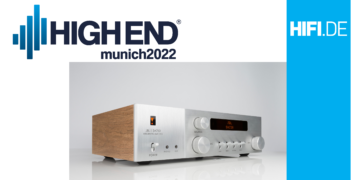| HIFI-FORUM » English » Surround (Engl.) » Short Term & Long Term Power in Speakers | |
|
|
||||
Short Term & Long Term Power in Speakers+A -A |
||
| Autor |
| |
|
SUNILYO
Stammgast |
#1
erstellt: 07. Jul 2006, 08:33

|
|
|
Hi all, I was going thru the website of Jamo. While looking at the specifications of their floor stander - E680 i came across the these details Power Long Term - 120 Power Short Term - 170 What does this mean? The speakers have an impedance of 6 ohms. So what i think is that long term is when they operate at 8 ohms and short term is when they operate at 6 ohms. Am i correct ? |
||
|
Amp_Nut
Inventar |
#2
erstellt: 07. Jul 2006, 09:31

|
|
Noooooo ! They operate at the SAME impedance, short term or long term. Its just that 170 Watts for short bursts of Music power will not melt the voice coil and damage it permanantly ! You can feed it 120 watts, for as long as you like, without melting any voice coil !  |
||
|
|
||
|
SUNILYO
Stammgast |
#3
erstellt: 07. Jul 2006, 09:51

|
|
|
[quote="Amp_Nut"][quote] You can feed it 120 watts, for as long as you like, without melting any voice coil !  [/quote] [/quote]So if attach it an avr with an output of 130 w will it cause any damage. secondly what is short bursts of power. it wasnt clear to me. |
||
|
Amp_Nut
Inventar |
#4
erstellt: 07. Jul 2006, 11:22

|
|
Its Nemulus to me too ! Guess will have to ask Jamo !  |
||
|
SUB_BOSS
Gesperrt |
#5
erstellt: 10. Jul 2006, 11:12

|
|
No it wouldn't harm even if you would attach a 200 watts per channel AVR. Short bursts are usually when you have some gun fights or bomb explosions. BTW you'll not damage your speakers if you use a 130 watt AVr unless you plan to drive em full volume always |
||
|
Amp_Nut
Inventar |
#6
erstellt: 10. Jul 2006, 11:41

|
|
|
Let me chip in with some technical facts : 1. Reproduced music contains most of its power in the low and mid frequencies. High frquencies (5 KHz and above) usually carry less than 5% of the total power. Hence a 100 watt (per channel) speaker will typically feed its tweeters less than 5 watts! As a result, tweeters are also design to handle about 10% to 20% of the total rated power. 2. A speaker rated at 150 watts has its cross-over, woofer and mid-range drivers capable of handling at least 150 watts continously, without burn out. Like any peace of wire, the coil in the woofer and mid-range can take short bursts of power without melting. How short ? Short enough so that heat does not accumulate and exceed the maximum voice coil operating temperature. 3. In a home environment, each speaker will rarely be driven with more than 10 watts of power continuously. Of course, short bursts of power will need to be delivered depending on the type of music. Estimates of the ratio of the average power to the peak power bursts vary. Some estimated as highest 20 times to 100 times the average power. 4. If you have a 100 watt amplifier which is called on to deliver a power burst (for a few milli seconds) of 200 watts, it will distort i.e. the waveform will clip. Tis clipped waveform is full of 'harmonics' or multiple of the basic frequency. This implies that the clip waveform is mainly high frequency energy. 5. The cross-over will divert all frequency energy to the tweeter. The tweeter is designed to handle only a small amount of power and therefore may burn out ! 6. As a result, a low power amplifier is more lilely to clip and glow the tweeter than a high power amplifier wich will not clip ! Hence, it is generally safer to drive your speakers with even a very high power amplifier than a low power amplifier, as long as you don't get carried away with feeding lots of continuous power such as during a party. |
||
|
SUNILYO
Stammgast |
#7
erstellt: 10. Jul 2006, 12:19

|
|
|
That was some techy stuff but very informative and helpful. thanks amp_nut |
||
|
Amp_Nut
Inventar |
#8
erstellt: 10. Jul 2006, 12:43

|
|
|
Guys, if you find some of my posts toooo techie, let me know so I  |
||
|
abhi.pani
Inventar |
#9
erstellt: 10. Jul 2006, 13:44

|
|
Tum Kamaal ho yaar...  Few years back while partying hard at my place, I blew both my sonodyne speaker's tweeter (only tweeters), I was wondering why only the tweeters got affected...today I know  I was also wondering what clipping is..your explanation is superb I was also wondering what clipping is..your explanation is superb  BTW what is soft clipping ?? How do we know that the amp is clipping or about to clip ?????      |
||
|
Amp_Nut
Inventar |
#10
erstellt: 10. Jul 2006, 16:08

|
|
First of all, thanks for the Thumbs Up !
1. When an amplifier 'Clips' the output voltage , instead for rising, gets ABRUPTLY flattened out. A 'soft clipping' circuit rounds off this sudden flattning of the waveform top. This reduces, somewhat, the amount of Very High freq harmonics, making the 'clipping' or distortion less objectionable. On the other hand, when you switch in the 'Soft Clip' circuit, it actually starts rounding off the waveform, BEFORE the actual onset of (hard) clipping. Hence a 30 Watt NAD will deliver, say 30 Watts with the soft clip switched OFF, but will have increased distortion, at even 28 Watts, with the 'Soft Clip' activated. 2. Sadly, no easy way to tell when the amp is about to clip.... just by ear, and that may not be too sharp with beer & friends around ! Some amps do have a small RED Light that glows to indicate clipping... Most speakers will take a little abuse, eg when cliping under normal listning, but during a party, it could get too much for the tweeter to handle on a prolonged basis. |
||
|
abhi.pani
Inventar |
#11
erstellt: 10. Jul 2006, 16:34

|
|
|
Soft Clipping - understood But still, atleast there must nbe some hint that the amp is almost clipping  I mean say I am not partying, just playing it loud, what could be the most obvious indication of clipping ?? I have found that when I reach about 3 o clock position on my Plinius, my Audience52 tweeters strats showing some distortion (minly during Bass lines) is it what you call clipping ? |
||
|
Amp_Nut
Inventar |
#12
erstellt: 10. Jul 2006, 16:52

|
|
YUP !  The bass lines demad max power, and the amp cant cope.. The 3 o'clock Volume postion can be a VERY Rough pointer, for your Source+Amp+Speakers+Room. Will change CD to CD ( or record to record ), because some CDs are recorded at a low average volume level, and others at a higher average level. |
||
|
SUNILYO
Stammgast |
#13
erstellt: 12. Jul 2006, 05:52

|
|
|
Hi Amp_nut I must have posted this question earlier in some other topic, but would like your view (in techy terms ;)). eg. if my AVR has an output of 130 W RMS continous @ 6 ohms and my speakers are capable of handling 130W @ 8 ohms. Now in such a scenario what will happen : 1. will the AVR give the output @ 8ohms, if so then how much will it be. or 2. will the speaker give the output @ 6 ohms (which i guess is not possible). if so then how much output will it be. whichever case is true what will happen and the maximum output level of the AVR? will any clipping / distortion occur ?? Secondly, a dealer told me the speakers RMS handling power should me greater than the output of the AVR, but according to you it is better to keep a slight low power speakers with the AVR. which one will be correct?? Please advise. [Beitrag von SUNILYO am 12. Jul 2006, 05:55 bearbeitet] |
||
|
Amp_Nut
Inventar |
#14
erstellt: 12. Jul 2006, 06:43

|
|
Yes, an AVR rated @ 130 Watts into 6 Ohms, will Certainly provide a healthy output .... though less than 130 Watts, into 8 Ohms. It will provide ( by calculation ) 97.5 Watts into 8 Ohms.
It should Comfortably drive your 8 Ohm speakers. The 8 Ohm rating of your speakers will suck Less current from the AVR, and in principle, your AVR will provide better sound into the lighter load presented by the 8 Ohm speaker load. |
||
|
Amp_Nut
Inventar |
#15
erstellt: 12. Jul 2006, 06:50

|
|
What the dealer told you, is IMHO the typical, less-thatn-fully-informed opnion, which is VERY common. That is why I posted in great detail, why and how a limited power amp is More Likely to destroy a speaker ( particularly the tweeter) than a High Power Amp. Ofcourse a monster amp pumping out full steasm to modest speakers will certainly blow the speakers. However, you will HEAR the spekers distorting hoplessly for a while before they actually blow due to excess power. I personally used a 400 Watt ( @ 4 Ohms ) Power Amp, driving my 200 Watt speakers.... often driven to VERY LOUD sound levels, without a problem, for the past 4 years, until I shifted to a 40 Watt Valve Amp, recently, driving the same speakers. NOW I have to fear from my tweeters...  |
||
|
Amp_Nut
Inventar |
#16
erstellt: 12. Jul 2006, 07:14

|
|
|
6 Ohms & 8 Ohms Speakers.... SUNILYO please consider the 6 or 8 ohm speaker ratings as Ball Park, INDICATIVE figures ONLY. A 6 Ohm speaker's impedance will ACTUALLY vary, at different frequencies from maybe 3 Ohms to 8 or even 16 ohms ! The Higher impedance is easily handled by the amp, the low impedance dips are what seperates the men from the boys - amp wise... |
||
|
SUNILYO
Stammgast |
#17
erstellt: 17. Jul 2006, 08:01

|
|
|
Hi everyone, Whats the use of bi-wired / bi-amped speakers? how to use them? is there any difference in sound output. In the manual of sonus itsays use bi-wiring method in order to avoid crosstalk. |
||
| ||
|
|
||||
| Das könnte Dich auch interessieren: |
|
Speakers 40K pserra77 am 13.07.2005 – Letzte Antwort am 13.07.2005 – 2 Beiträge |
|
Speakers for cambridge audio receiver kvish am 26.07.2006 – Letzte Antwort am 10.08.2006 – 14 Beiträge |
|
Klegg speakers! atmadesh am 19.07.2005 – Letzte Antwort am 21.07.2005 – 5 Beiträge |
|
5.1 SPEAKERS vominhtan74 am 14.09.2004 – Letzte Antwort am 22.09.2004 – 2 Beiträge |
|
Help required for buying bookshelf speakers verynewone am 30.08.2005 – Letzte Antwort am 07.09.2005 – 11 Beiträge |
|
SPEAKERS FOR RECEIVER Anandjacob am 09.07.2005 – Letzte Antwort am 19.07.2005 – 17 Beiträge |
|
Speakers for Marantz SR4600 Voodoo_CHild am 13.01.2007 – Letzte Antwort am 05.03.2007 – 9 Beiträge |
|
Speakers for HT neono am 08.07.2006 – Letzte Antwort am 08.07.2006 – 2 Beiträge |
|
Floor Standing speakers VivekMansata am 07.11.2007 – Letzte Antwort am 07.11.2007 – 2 Beiträge |
|
Where to purchase stereo speakers?? dsantamassino am 24.02.2004 – Letzte Antwort am 15.10.2004 – 3 Beiträge |
Foren Archiv
2006
Anzeige
Produkte in diesem Thread

Aktuelle Aktion
Top 10 Threads der letzten 7 Tage

- Hotel Modus deaktivieren
- "diese anwendung wird jetzt neu gestartet um mehr speicherplatz verfügbar zu machen"
- Von HD+ zurück zu Standard-TV
- Remotekabel anschließen, aber wie und wo?
- Hisense verbindet sich nicht mehr mit dem WLAN
- Audiodeskription ausschalten (in ZDF App) 803er
- Umschalten von TV auf Radio
- Satellitenschüssel was und wie einstellen am TV
- Pro 7 und Sat 1 auf einmal weg.
- Markierung an Lautsprecherkabel - welche Norm?
Top 10 Threads der letzten 50 Tage

- Hotel Modus deaktivieren
- "diese anwendung wird jetzt neu gestartet um mehr speicherplatz verfügbar zu machen"
- Von HD+ zurück zu Standard-TV
- Remotekabel anschließen, aber wie und wo?
- Hisense verbindet sich nicht mehr mit dem WLAN
- Audiodeskription ausschalten (in ZDF App) 803er
- Umschalten von TV auf Radio
- Satellitenschüssel was und wie einstellen am TV
- Pro 7 und Sat 1 auf einmal weg.
- Markierung an Lautsprecherkabel - welche Norm?
Top 10 Suchanfragen

Forumsstatistik

- Registrierte Mitglieder930.516 ( Heute: 1 )
- Neuestes MitgliedTimm67
- Gesamtzahl an Themen1.563.059
- Gesamtzahl an Beiträgen21.815.745










